Another week with automakers sharing plans to either curtail development of internal combustion engines or share their EV sales goals – in this case German luxury OEMs, Audi and BMW. We see images of the upcoming BMW i4 BEV, Jeep Wrangler Magneto BEV concept, Rivian announces their new charging networks, and much, much, more.
Automakers and Models
Audi Will Stop Developing Internal Combustion Engines – According to Audi CEO Marcus Duesmann, the automaker will not develop any new internal combustion engines, and will begin phasing out the current gasoline and diesel engines and replacing them with electric powertrains. In an interview with German-language industry news outlet Automobilwoche, Duesmann confirmed the decision. “We will no longer develop a new internal combustion engine, but will adapt our existing internal combustion engines to new emission guidelines,” Duesmann told the publication. Audi aims to offer 20 EV models in the next 5 years, but it is pretty clear that the company will continue to sell ICE vehicles until at least the end of the decade. – March 16, via Road & Track
BMW plans for half of global sales to be EVs by 2030 but no. expiration date for ICE – BMW expects electric cars to account for half of its global sales by 2030, but doesn’t plan to stop developing internal-combustion engines, the automaker announced during its annual conference last week. BMW also said it will have a dozen all-electric models on the road by 2023, covering 90% of market segments, and expects the Mini brand to be all-electric “by the early 2030s.” This hesitance is reflected in BMW’s upcoming lineup of EVs with most being electric versions of existing internal-combustion models.- March 22, via Green Car Reports
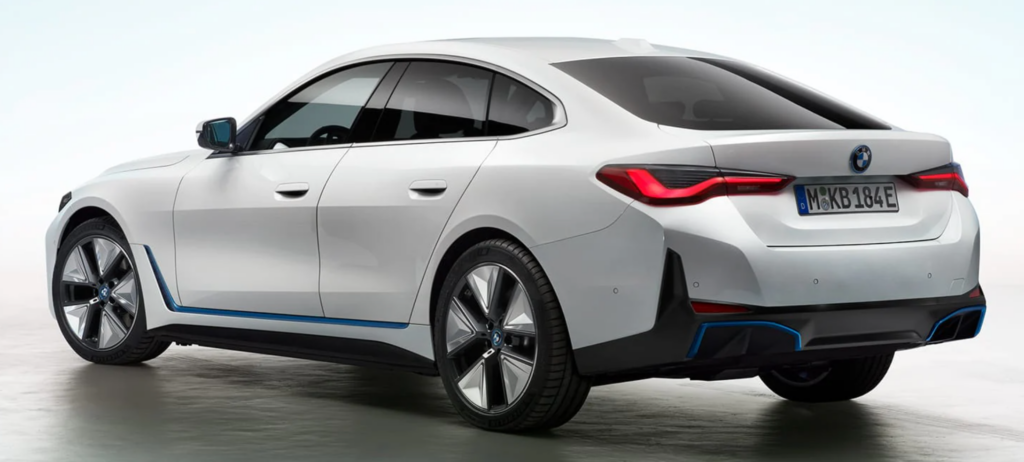
BMW unveils the exterior of the i4, its first electric sedan – BMW also shared exterior images of the i4, its first electric sedan that is slated to be available in 2022 and BMW said Wednesday that it will also offer an M Performance model. The company said the i4 will be available in different configurations, with a max range of around 300 miles and power of around 390kW (roughly 530 horsepower) that’s delivered from a single motor. Separately, according to Car and Driver, the 3 series-based EV will have an 80.0-kWh battery pack. – March 22, via The Verge
Future Ford EV Plans Include Two Additional Crossovers – According to Ford Authority, Ford is planning two additional mid-size electric crossovers – which will be built alongside the Mach-E at the Ford Cuautitlan Assembly Plant in Mexico. The forthcoming EV crossovers, which will reportedly carry the internal codenames CDX746 and CDX747, are expected to enter production in late 2022 or early 2023 and go on sale for the 2023 model year. Sizing will be roughly equivalent to that of the Lincoln Nautilus. – March 17, via Ford Authority
How Volkswagen aims to beat Tesla at its own game – Volkswagen recently held its Power Day, which is being compared to Tesla’s Battery Day event held late in 2020. Under VW’s plans for battery production, the company will aim to have an interest in six battery plants in Europe by 2030 at a cost of around $29 billion, according to estimates by BloombergNEF. Meanwhile, VW’s CEO said 60 percent of the company’s vehicle sales should be electric by the end of the decade. There will also be a shift of internal resources to software development for autonomous vehicles. – March 17, Politico.eu
Jeep teases BEV Wrangler – Jeep teased a concept BEV version of its popular Wrangler called Magneto. The Magneto is slated to have a 70 kwh of battery capacity, at 800 volts and split among four Webasto air-cooled lithium-ion battery packs. The layout would have one pack up where the engine would be, one in back, and two toward the rear axle and tucked inside the frame rails. Interestingly, the Magneto will have a 6-speed manual transmission, including with a clutch pedal. – March 22, via Green Car Reports
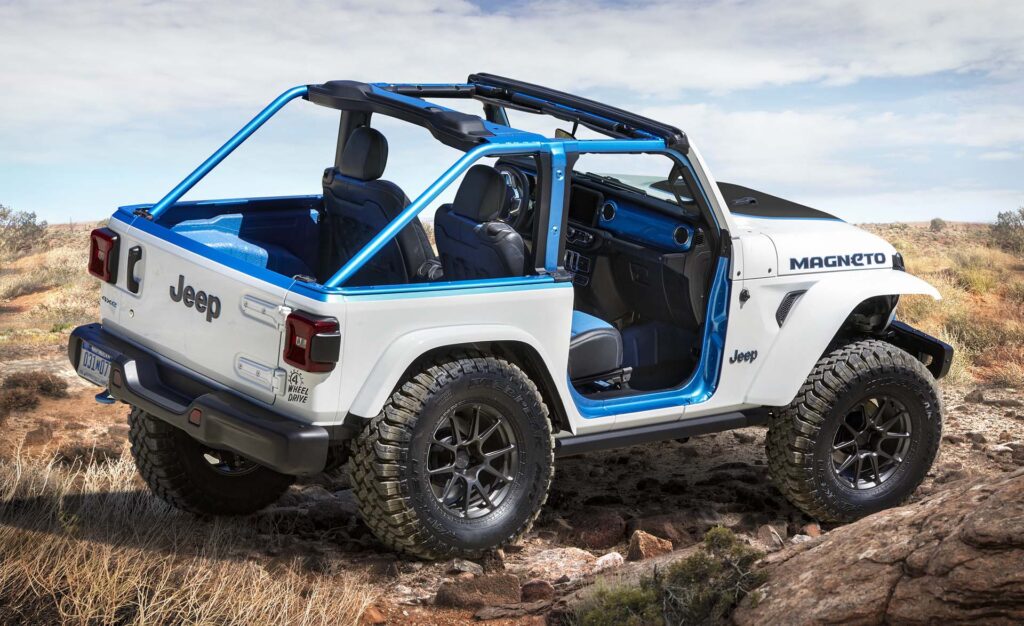
Jeep Wrangler 4xe Gets 21 Miles Of EPA Electric Range – The all-new Jeep Wrangler 4xe plug-in hybrid has received official EPA range and efficiency ratings, with the PHEV achieving an all-electric range up to 21 miles (34 km). According to InsideEVs, the EPA rating is lower than an expected 25 ,miles of electric range. The plug-in hybrid Wrangler is equipped with a 17 kWh battery, which means that the 21 miles of range is half that of the Toyota RAV4 Prime, which has an 18 kWh battery pack.- March 18, via InsideEVs
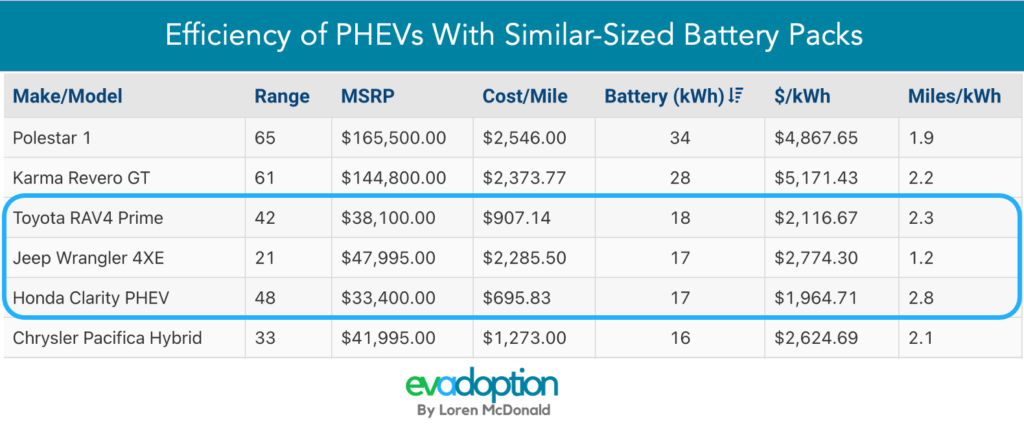
Toyota Aygo X Prologue debuts, previews electric future – Toyota has revealed the Aygo X Prologue, a small city car that is expected to be a battery-electric vehicle. The next-generation Aygo won’t come to the U.S. anytime soon, but this concept is a good indicator that Toyota is about to jump into the EV game. – March 17, via EVPulse
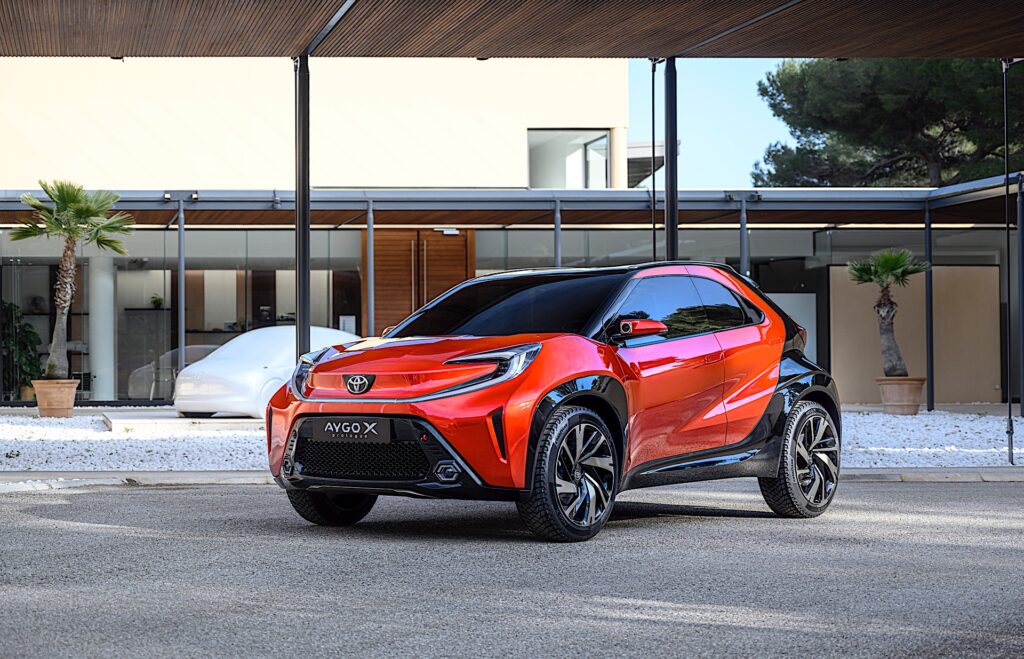
VW ID Buzz minibus could start at under $50,000 – Electrek, based on a report from the German publication Edison, said that the retro VW minibus could start between 40,000 and 60,000 euros )~$47,500 to $71,300 USD) depending on the version. The lower-priced version will reportedly have a battery with around 60 kWh (300 kilometers WLTP range/~166 miles EPA range), while the higher-end model will be powered by a 100 kWh battery (500 kilometers WLTP range/~277 miles EPA range). – March 19, via Electrek
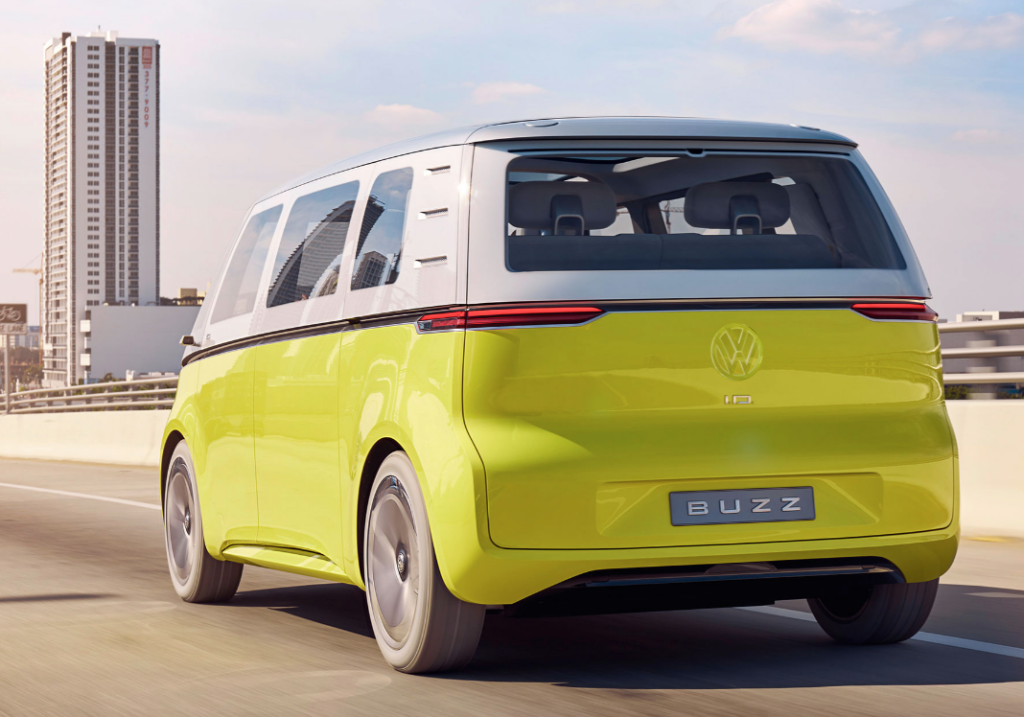
Batteries and Charging
Rivian shares plans for its charging networks – Rivian is building its Rivian Adventure Network, a nationwide network of DC fast chargers capable of adding up to 140 miles of range in 20 minutes to the R1T and R1S. The DC fast charging networks will connect cities on popular routes across the US and Canada and extend further into more remote destinations, including many national parks. These locations will begin opening this year, but the Adventure Network is only available for Rivian drivers.
Rivian also plans to install 10,000 Level 2 AC chargers and launch the Rivian Waypoint network. These Level 2 chargers will be open to all EV drivers and will be located at shopping centers, restaurants, hotels, campsites, parks and many other locations in the US and Canada. – March 18, via Rivian website
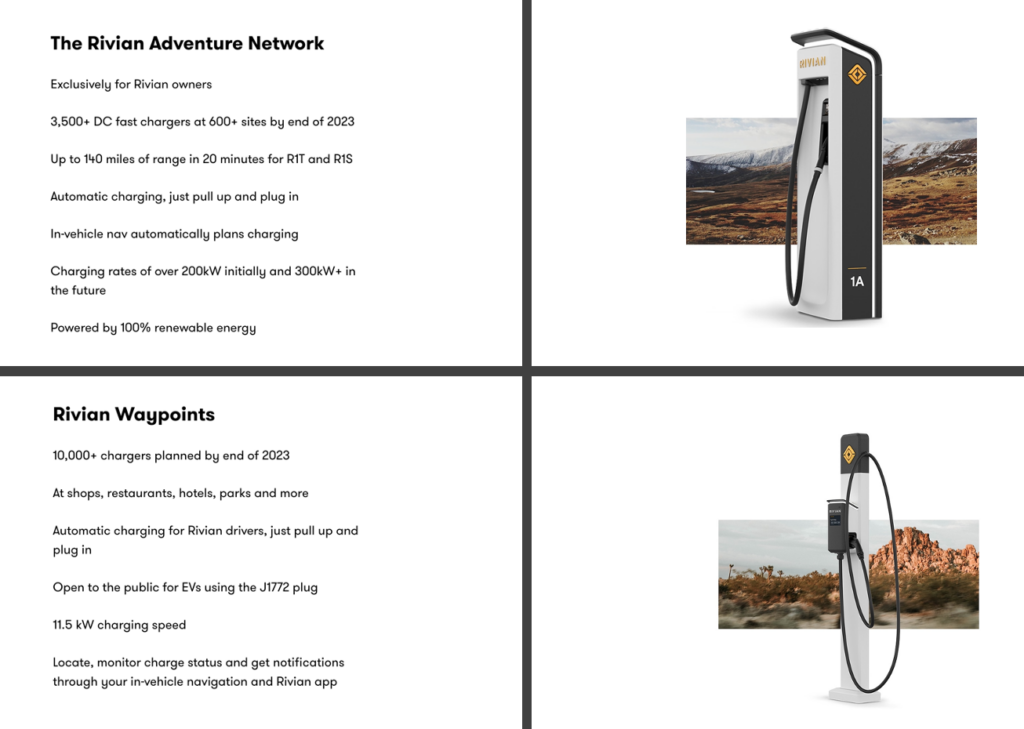
EVgo To Install Fast Chargers At Meijer Stores – EVgo has announced a new partnership with Meijer, a Midwestern retailer, to install electric vehicle charging infrastructure at its supercenters. Meijer customers will have access to the 100 kW to 350 kW EVgo fast charging stations beginning this summer. No details were provided on the number of sites.- March 21, via InsideEVs and EVgo
Power Play: Volkswagen abruptly pulls plug on South Korean battery makers – Days before Volkswagen AG held an event to announce a major ramp-up in its electric vehicle production, the German car maker abruptly told its South Korean battery suppliers their current technology would be largely excluded from those plans. The decision by the world’s second largest automaker to move the bulk of its cars to a different battery cell in two years came as a shock to LG Energy Solution and SK Innovation, three people with knowledge of the situation told Reuters.
Volkswagen’s shift to a new unified prismatic battery, away from the pouch-style manufactured by LG and SK, is likely to be a massive blow given the pair have invested billions in pouch production sites in the United States, Europe and Asia. – March 17, via Reuters
Regulations and Incentives
UK reduces EV incentive cap to £35,000 from £50,000 ending subsidies of higher-cost EVs – The UK government has cut grants for electric car buyers, with the maximum grant for electric cars was reduced from £3,000 to £2,500 with immediate effect on Thursday. The government also lowered the price cap for cars eligible for the subsidy from £50,000 to £35,000. The cut received much attention in the US as Tesla’s Model 3, the top-selling EV in the UK, no lonbger qualifies for the incentive. – March 18, The Guardian
Funding, IPOs, Mergers & Acquisitions
CIIG Merger Corp. (CIIC) Shareholders Approve Arrival Deal – CIIG Merger Corp. (NASDAQ:LOAC) announced that its shareholders had approved its combination with EV-maker Arrival. The transaction is expected to close on March 24 and shares are expected to trade on the Nasdaq under the symbol “ARVL” beginning on March 25. UK-based Arrival makes zero-emission buses and vans designed for public transit and commercial fleets, such as that of parcel delivery service UPS, which has ordered 10,000. – March 20, via SPACInsider
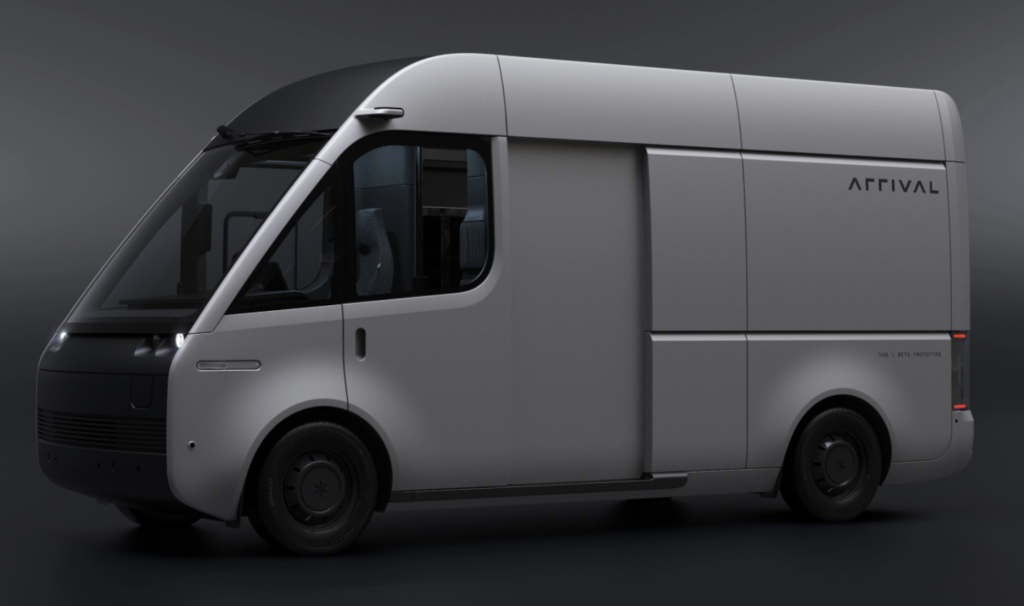
 Announcing the acquisition of EVAdoption by Paren →
Announcing the acquisition of EVAdoption by Paren →
2 Responses
Regarding the Rivian announcement that they will build their own charging network, doesn’t this raise the ante for other car manufacturers to allocate more of their own funding (of course they would love for the government to fund them) towards their own set of chargers to compete with Tesla and Rivian? Should we expect to see more announcements like this from the other manufacturers? I would think so, but interested in what you are hearing.
Good point/question about this putting pressure on other automakers to develop their own networks. In short, I don’t think so. I’ve met with Lucid Motor’s CEO Peter Rawlinson and he is firm that there is no need for them to launch their own network. He feels it isn’t needed because of the expansion by Electrify America, EVgo and others. Secondly he feels it is an unnecessary hit on their balance sheet.
I’ve also had multiple conversations with GM’s EV charging infrastructure team, and also have no interest in developing their own network and look to their partner EVgo to build out fast charging locations – with an undisclosed, but clearly small investment. VW in essence has its own network via Electrify America, albeit it is open to all EV brands.
With the amount of money that is (and will be) being invested by the federal, state, and local governments combined with private capital and the public markets investing into the networks, I think it is very unlikely that any other OEMs will build out their EV charging networks. We may, however, see more networks that are funding by multiple OEMs, such as IONITY in Europe.